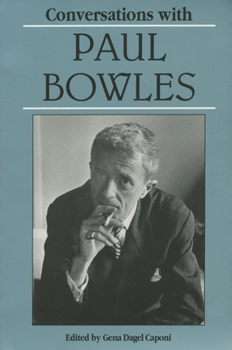Conversations with Paul Bowles
Select Format
Select Condition 
Book Overview
For the past forty years, Paul Bowles has answered questions about the autobiographical references in his novels (The Sheltering Sky, Let It Come Down, The Spider's House, and Up Above the World) and about his work as a composer in New York, all the time insisting, "I don't want anyone to know about me." In these more than twenty interviews dating from 1952 to the present, Bowles gives a variety of answers that reveal as much as they conceal. Too gracious to refuse interviews, he regards inquiries with the same clear-eyed detachment that marks his prose, wondering, "Why is it that Americans expect an artist's work to be a reflection of his life? They never seem to want to believe that the two can be independent of each other and go their separate ways." Despite his reticence, Bowles frankly discusses his "unconscious" writing practice, his views on the "illiterate imagination," existentialism, his various experiments with altered states of consciousness, and nearly fifty years of expatriate life in Morocco. Included are three interviews never before published, several interviews that originally appeared in now obscure journals, plus interviews by Jay Mclnerny for Vanity Fair, Jeffrey Bailey for The Paris Review, and Michael Rogers for Rolling Stone.
Format:Paperback
Language:English
ISBN:0878056505
ISBN13:9780878056507
Release Date:November 1993
Publisher:University Press of Mississippi
Length:286 Pages
Weight:1.05 lbs.
Dimensions:0.8" x 6.1" x 9.0"
Customer Reviews
1 rating
Gives even the real Bowles fan interesting new insights
Published by Thriftbooks.com User , 26 years ago
Caponi's collection of interviews, spanning several decades up to the early 1990's is a must for all real fans of Paul Bowles work, and an intriguing introduction to his life, work and influences for those who know little about him. As with any such collection of interviews, there is bound to be much repetition - different interviewers ask often essentially the same questions, while Bowles gives (more or less) the same answers. However, even for someone like myself, who thinks they know quite a bit about the man and his work (and maintains one of the Paul Bowles pages on the Web - Many of the interviews touch on many of the other literary figures Bowles has known - Tennessee Williams is a frequent topic of conversation, as are William Burroughs and the other beat writers, and their time spent in Tangiers. It becomes very evident from the few interviews that dwell on the subject that Bowles is not going to talk much about his late wife, Jane. His hatred for the biography 'An invisible spectator' comes through clearly in several places, but I found it intriguing that his preferred biographer (if he had to make a reluctant choice) would be Millicent Dillon, author of the biography of Jane Bowles. Altogether a very worthwhile read for anyone with any interest in Paul Bowles.





